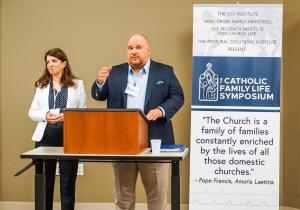
Pastoral Malpractice
– Dr. Greg Popcak
A physician I know was recently faced a dilemma. A patient of hers on pain medication began engaging in behaviors that made it clear the patient was abusing, and possibly, selling, his meds. The doctor had to refuse to refill the prescription and recommend an alternative course of treatment. The patient stormed out, accusing her of being, “uncaring and unprofessional.”
Sadly, treatments can be abused. When they are, responsible caregivers must refuse those treatments until the problems preventing them from being effective are overcome. The failure to do so can constitute professional malpractice.
The fact is, even the treatments prescribed by the Divine Physician can be abused. God gives us the sacraments to treat the spiritual illness—sin–that damages our relationships with God and others. Normally, these “treatments” should be readily available to every Christian “patient.” The sacraments aren’t rewards for good behavior. They’re treatments for spiritual disease. But when treatments are abused, they must be refused.
Take Confession. If someone confesses a sin but says he intends to keep committing the same sin, the priest—who functions as a kind of Divine “Physician Assistant” when it comes to the sacraments—is actually obliged to deny absolution. For pastors to give absolution under such circumstances would be to encourage the sinful behavior and make themselves party to it by spiritually enabling it.
The Eucharist is another example. It’s the ultimate “spiritual treatment” for healing the damage sin does to our relationships with God and others. But this “treatment” isn’t magic. In order for it to be efficacious, the recipient needs to be seeking strength to live the Christian vision of love. If someone receives communion because they want help overcoming the struggles they face in learning to love like Christ, they should never be denied communion because it’s the very “medicine” they are looking for.
But what if someone’s persistent behavior severely wounds the Body of Christ? What if they dedicate themselves to organizing racist rallies? What if they eagerly promote the slaughter of children in the name of “healthcare?” What if this person has been begged dozens—even hundreds–of times to stop wounding the Body of Christ in such a way, but they dismiss those warnings, insisting that what they’re doing is actually good? Let’s further say that this person draws deep personal comfort from being allowed to receive the Eucharist.
Should they? Is it responsible to allow anyone to experience spiritual consolation while they intentionally, persistently, and unapologetically scourged the Body of Christ? In St. Ignatius’ words, wouldn’t such a consolation, in fact, be a desolation of the Enemy?
Of course, God would certainly forgive such a person, but even God can’t forgive someone who doesn’t believe they need it. And to know we need forgiveness, don’t we need to be allowed to feel the separation from God that our actions necessarily cause?
Permitting such a person to receive the Eucharist not only allows him to “eat and drink judgment on himself” (1 Cor 11:29) but also constitutes pastoral malpractice (c.f. Ezekial 3:18).
As the bishops continue to debate whether to allow President Biden to receive communion, they would do well to stop letting ideologues frame this as a political issue and, instead, take a clear stand against pastoral malpractice. There is nothing “pastoral” about letting people use the Body of Christ as an anesthetic to numb themselves while they abuse the Body of Christ.
Dr. Greg Popcak is the author of many books and the Executive Director of the Pastoral Solutions Institute (CatholicCounselors.com).










